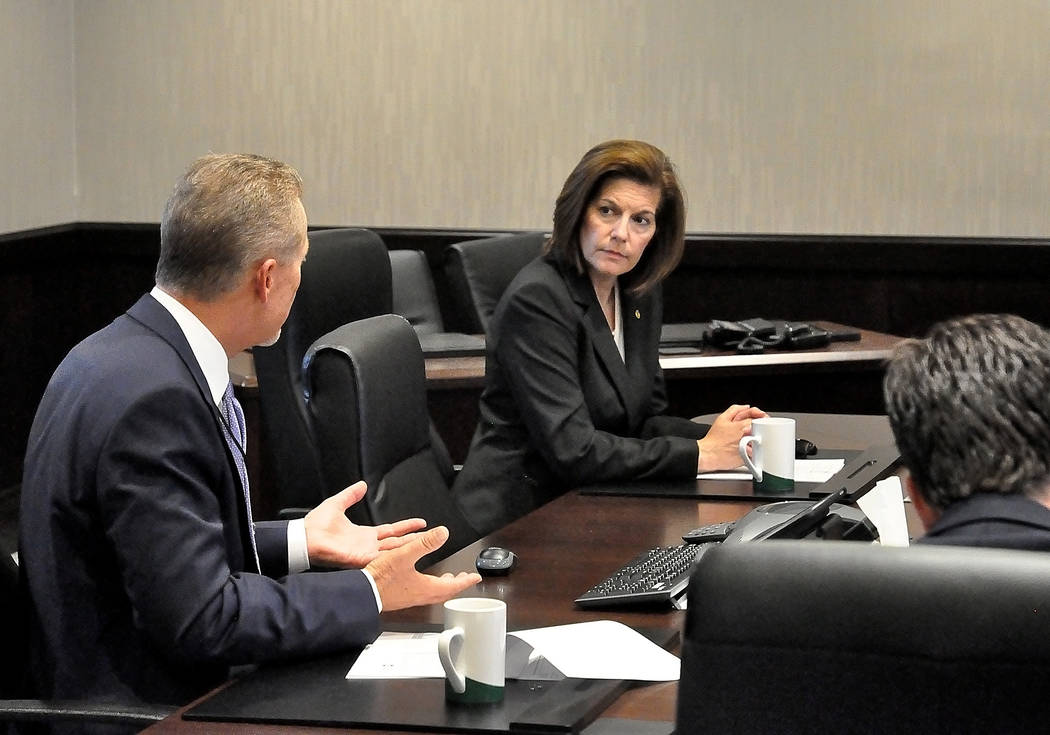
U.S. Sen. Catherine Cortez Masto, D-Nevada, stopped in Pahrump on Tuesday, marking her first visit to town since winning the election in November 2016.
Cortez Masto toured the Pahrump-based co-op, Valley Electric Association, where she looked at the dispatch center and discussed broadband Internet and Valley Electric’s other initiatives with the company’s officials.
Valley Electric CEO Tom Husted gave Cortez Masto a brief overview of the dispatch center where VEA gets information about the weather and manages output loads.
“We are on the market 24/7 on power supply, which is also unusual for a small utility,” Husted told Cortez Masto.
Valley Electric currently provides energy to approximately 45,000 consumers along the Nevada-California line. Among the areas that it serves are Sandy Valley, Pahrump, Beatty, Amargosa Valley and Fish Lake Valley.
Husted said Valley Electric historically placed the vast majority of its assets into transmission infrastructure instead of generation.
“We are an island utility, we had to build a transmission, but then transmission allowed us to have avenues to markets, and so we weren’t tied down to one huge, long-term investment generation,” Husted said.
Husted said that Valley Electric can focus on the smallest parts of its system including poles and wires running down streets, as the technology allows them to zoom in and go after specific substations.
Husted said the entire grid is going to be operating on fiber-optics.
“It allows us to have that real-time communication,” he said. “Now, we are taking it the next step farther and with Valley Communications, we are running fiber-optics to every residence, business, etc.”
“We’ve got a product that is hard to manage, so the technology has to be increased to allow for smart grid, smart communities, smart consumers. And that’s where we need to go,” Husted said.
Committee work
Cortez Masto sits on six committees in the U.S. Senate. Among them are the Senate Committee on Energy, Natural Resources and the United States Senate Committee on Commerce, Science and Transportation.
She said she has been looking at passing legislation that would create incentives for companies such as Valley Electric to innovate and get necessary resources.
“I have seen the future, it’s smart cities, it’s the Internet, interconnectivity. I think it’s going to be important at the federal level to support that, incentivize it,” she said.
“My goal is to make sure that we are addressing siting issues, as well as permitting issues, because most of Nevada is owned by the federal government, and so I’ve been very aggressive with those agencies already in the committees that I sit on asking them to coordinate and asking them to cut down the timelines for not only the permitting process but the siting for the infrastructure that’s needed for broadband, or anything else on federal lands,” she said.
In an interview after the tour, Cortez Masto called Valley Electric rural broadband “a model for the country on how the Internet of things and a new technology can work in efficiency.”
“This is cutting edge and it is an example of what really works when you are identifying your customers as a focus of the service that you provide,” Cortez Masto said.
Other rural issues
Rural broadband is key to addressing many challenges in rural communities such as services, workforce shortage, transportation and health care, Cortez Masto said.
“To me, rural broadband is an important first step because it not only opens up those lines of communication, it brings telemedicine, it brings telehealth, it brings education, so many opportunities to our rural communities that are a real challenge,” she said. “The other thing for me though is the transportation and the challenge we have getting people around who may not be mobile because they don’t have a car.”
Cortez Masto said she looks forward to participating in investing in Nevada’s and national infrastructure.
“It’s exciting for me to be able to be in the United States Senate and continue to work on projects like this and help to stimulate, promote, find funding for them and tear down the barriers where necessary,” she said.
Contact reporter Daria Sokolova at dsokolova@pvtimes.com. On Twitter: @dariasokolova77